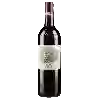
Winery Marquis de MascaretBordeaux Merlot
This wine generally goes well with poultry, beef or veal.
Food and wine pairings with Bordeaux Merlot
Pairings that work perfectly with Bordeaux Merlot
Original food and wine pairings with Bordeaux Merlot
The Bordeaux Merlot of Winery Marquis de Mascaret matches generally quite well with dishes of beef, veal or game (deer, venison) such as recipes of fondue bourguignonne and accompanying sauces, blanquette of veal or rabbit leg in foil on the barbecue.
Details and technical informations about Winery Marquis de Mascaret's Bordeaux Merlot.
Discover the grape variety: Merlot
Merlot noir is a grape variety that originated in France (Bordeaux). It produces a variety of grape specially used for wine making. It is rare to find this grape to eat on our tables. This variety of grape is characterized by small to medium sized bunches, and medium sized grapes. Merlot noir can be found in many vineyards: South West, Languedoc & Roussillon, Cognac, Bordeaux, Loire Valley, Armagnac, Burgundy, Jura, Champagne, Rhone Valley, Beaujolais, Provence & Corsica, Savoie & Bugey.
Informations about the Winery Marquis de Mascaret
The Winery Marquis de Mascaret is one of of the world's greatest estates. It offers 4 wines for sale in the of Bordeaux to come and discover on site or to buy online.
The wine region of Bordeaux
Bordeaux, in southwestern France, is one of the most famous, prestigious and prolific wine regions in the world. The majority of Bordeaux wines (nearly 90% of the production Volume) are the Dry, medium and Full-bodied red Bordeaux blends for which it is famous. The finest (and most expensive) are the wines of the great châteaux of Haut-Médoc and the right bank appellations of Saint-Émilion and Pomerol. The former focuses (at the highest level) on Cabernet Sauvignon, the latter on Merlot.
The word of the wine: Pulp
Fleshy and juicy part of the grape berry, it contains sugars, organic acids and various nitrogenous and mineral compounds.












